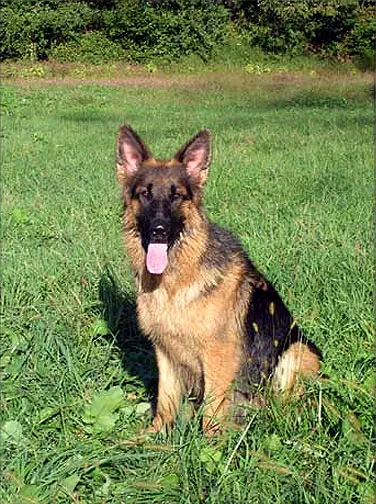Welcoming a 10-week-old German Shepherd puppy into your home is an exciting milestone, filled with boundless energy, adorable antics, and rapid development. At this age, these magnificent puppies are transitioning from their earliest puppyhood into a phase of intense learning and growth. If you’re searching for Pictures Of 10 Week Old German Shepherd Puppies, you’re likely enchanted by their charm and eager to understand what to expect during this crucial stage. From their physical appearance to their blossoming personalities and unique coat characteristics, this period is full of wonderful discoveries for new owners.
The Enchanting World of 10-Week-Old German Shepherd Puppies
At 10 weeks old, German Shepherd puppies are bundles of fluffy joy, rapidly growing and exploring their world with increasing confidence. Physically, they are still quite small but already show the distinctive features of their noble breed.
Most 10-week-old GSD puppies will weigh anywhere from 15 to 22 pounds (approximately 6.8 to 10 kg), though this can vary depending on their lineage, sex, and individual growth rate. They will have a sturdy, compact build, with noticeably large paws that hint at the size they will eventually grow into. Their puppy coat is typically soft and thick, giving them a “fluffy” appearance that many find incredibly endearing. This is a temporary coat, however, and will eventually be replaced by their adult fur. Their ears, which might have been floppy just a few weeks prior, are often in the process of standing erect, or may already be fully upright. Some may still have one or both ears partially flopped or “tipped,” which is perfectly normal at this stage and usually resolves as their cartilage strengthens. Eye color is often a deep blue or grey at birth, gradually changing to varying shades of brown as they mature. You might even find some variations like a rare white german shepherd with blue eyes, though this is less common for the breed.
Decoding German Shepherd Puppy Coats: Fluff vs. Long-Haired
One common observation when looking at pictures of 10-week-old German Shepherd puppies is their seemingly fluffy coats. This can sometimes lead to confusion, as some believe their puppy will be a long-haired German Shepherd simply because they appear extra fluffy at this young age. It’s important to understand the distinction.
German Shepherds typically have a double coat: a dense, harsh outer coat and a softer, thick undercoat. True long-haired German Shepherds are born with a recessive gene that gives them a longer, often silkier outer coat and, crucially, they lack the dense undercoat of their standard-coated counterparts. At 8 to 10 weeks old, many GSD puppies are big, adorable fluff balls. This is a normal phase of puppy coat development. Around 14 to 16 weeks, puppies begin to “blow” their puppy coat, shedding the soft fluff and starting to develop their adult fur. This is when many fluffy puppies lose that characteristic look and start to resemble a standard-coated adult German Shepherd.
However, if a puppy, even after the puppy coat starts to shed, still displays noticeable tufts of hair in their ears or between their toes, it’s a strong indicator that they will indeed develop into a long-coated dog. While the long coat is considered a breed fault in some show rings, it’s purely a cosmetic trait and does not impact the dog’s health, temperament, or working ability. In fact, many individuals find long haired German Shepherd puppy pictures and their adult counterparts incredibly beautiful, appreciating their flowing coats. This is in contrast to pictures of short haired German Shepherds who have the typical dense, close-lying coat. For pet owners, the coat type is a matter of preference and does not hinder a dog from being a wonderful companion.
 Adorable 9.5-week-old long-haired German Shepherd puppy sitting gracefully
Adorable 9.5-week-old long-haired German Shepherd puppy sitting gracefully
Nurturing Your 10-Week-Old German Shepherd: Care & Training Essentials
Beyond their captivating appearance, 10-week-old German Shepherd puppies require consistent care and early training to develop into well-adjusted adults. This period is critical for socialization, health, and laying the groundwork for future behavior.
Nutrition: A high-quality puppy food specifically formulated for large breeds is essential. Follow your vet’s recommendations for portion sizes and feeding schedules, typically 3-4 meals a day. Ensure they always have access to fresh water.
Health & Vet Visits: At 10 weeks, your puppy should be up-to-date on their initial vaccinations (often including distemper, parvovirus, adenovirus, and parainfluenza) and deworming. Continue regular veterinary check-ups to monitor their health and discuss future vaccinations, like rabies, and parasite prevention.
Early Training: This is a prime time for learning! Start with basic commands like “sit,” “stay,” “come,” and “down” using positive reinforcement methods. Potty training and crate training are also crucial at this age, helping to establish routines and good habits. Consistency and patience are key.
Socialization: Exposing your puppy to a variety of positive experiences, sounds, sights, people, and vaccinated dogs during this developmental window is vital. Enroll in puppy classes, arrange playdates, and take them on short, supervised outings. Proper socialization helps prevent fear and aggression issues later in life. As they grow, you’ll see how these early experiences shape them, influencing even how they appear in German Shepherd 6 months old pictures.
 Stunning adult long-haired German Shepherd with a luxurious coat
Stunning adult long-haired German Shepherd with a luxurious coat
Capturing the Moment: Tips for Taking Perfect Pictures of Your 10-Week-Old GSD
With their rapid growth and charming personalities, you’ll want to capture every moment of your 10-week-old German Shepherd puppy. Here are some tips for taking beautiful photographs:
- Lighting is Key: Natural light works best. Try to photograph them outdoors during the “golden hours” (early morning or late afternoon) or near a window indoors.
- Get Down to Their Level: Crouch or lie on the floor to capture their perspective. This makes the photos more intimate and engaging.
- Patience and Play: Puppies are constantly on the move. Don’t expect them to sit perfectly still. Engage them with toys, treats, or gentle calls to capture their expressions and playful energy. Candid shots often turn out to be the most heartwarming.
- Focus on Details: Don’t just take full body shots. Capture close-ups of their velvety ears, their curious eyes, or their large, clumsy paws to highlight their unique puppy features.
 Close-up of an adult long-haired German Shepherd showcasing its silky outer coat without an undercoat
Close-up of an adult long-haired German Shepherd showcasing its silky outer coat without an undercoat
Conclusion
The first few months with your German Shepherd puppy are an incredible journey, and the 10-week mark is a particularly delightful and formative period. From their adorable fluffy appearance, which might or might not hint at a long-haired future, to their budding intelligence and playful spirit, there’s so much to cherish. Providing consistent care, early socialization, and positive training experiences will help your 10-week-old German Shepherd puppy grow into a well-behaved, happy, and loyal companion. Embrace the fleeting moments of their puppyhood, capture them with plenty of pictures, and enjoy every step of their development. If you’re considering bringing one of these magnificent dogs into your life, exploring options like king German Shepherd puppies for sale can be a good starting point.
